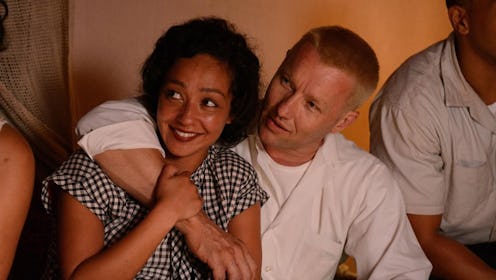Entertainment
Why We Need More Movies Like 'Loving'

In 2016 we are fortunate to live in a society where women and men of all races and sexual orientations are allowed to wed without penalty, but a little over 50 years ago, Americans weren't so lucky. Loving , a film by Jeff Nichols, chronicles the story of Richard (Joel Edgerton) and Mildred (Ruth Negga) Loving, a white man and a black woman who were arrested simply because they loved one another and wanted their love to be recognized. The couple was charged with violating the Racial Integrity Act of 1924, and were given an ultimatum: Spend your sentence behind bars or leave the state of Virginia for 25 years. Because of this, the couple sued the state years later when they were living in D.C., and their case, Loving v. Virginia, went all the way to the Supreme Court, resulting in miscegenation laws being abolished nationally.
"Not many Americans know about the Lovings," Australian actor Joel Edgerton tells me. "Given that they were at the center of changing the Constitution and were part of a movement that was that was so massive on the Civil Rights timeline of this country, I was kind of shocked."
And he might be right. I had no idea who the Lovings were before seeing the first trailer for the film, but perhaps why that's why this movie, and films like it, are so important. It was only half a century ago that it became legal for interracial couples to marry in every state, and yet in the 50-plus years since the decision, most couples shown on screen are made up of two people of the same race.
"When you look at the exponential rise in statistics of interracial marriage in this country, it's due to their case. That's undeniable," the 42-year-old says. "I've had many, many people come up to me at screenings and tell me, 'This is my parents' story. This is my grandparents' story, and I would not have existed if Mildred and Richard weren't who they were and they hadn't endured the storm."
At the Los Angeles premiere for the film, I find myself having a similar conversation. After the film I ask a woman of color standing next to me how she liked it, and she's momentarily lost for words: "I'm just shocked. This is my story," she says. "My husband is white and there's so much that I can relate to."
Clearly, Richard and Mildred's story is one that is overdue to be told, and it's still entirely relevant. Edgerton agrees, saying, "It's a very modern, resonant film about stuff that's very shameful that's still going on today. I know we can say that same-sex marriage is now legal in this country, but why did it take so long? Why are there other little mini laws that are popping up here and there, state by state, that negate the official umbrella law of equality in marriage? The ability for individual shop owners to reject service to same-sex couples, for example."
Edgerton, who reminds me that same-sex marriage is still illegal in Australia, hopes Loving, and films like it, will normalize the idea of marriages of every kind, everywhere. Because while some may still hold archaic ideas of what kinds of love should be accepted or restricted, it's easy to determine who the bad guys are in love stories portrayed on screen. Edgerton says it best: "It's hard to stop or deny love, and it's hard to prevent change. As human beings, we have a very strict moral compass, and when we watch stories where people are in love, and people stand in the way of that... those people are clearly the villains."
And he's right — take any love story ever: those who seek to tear couples apart are the bad guys, almost without exception. So why isn't it as cut and dry in real life?
"Cinemas are a place where people's moral compasses become very clear. We intuitively feel who's wrong and who's right. Whereas, in life it's harder to really examine that, especially within ourselves," says the actor. "I think it's harder for us to walk through life and think, 'Am I being good in this moment?' or 'Am I the hero, or am I the villain?'"
Yet the Lovings proved that — not unlike a Disney fairy tale — goodness can trump evil, and hope and happiness can succeed, especially if we see real life examples of these victories on screen.
"There is an undeniable, gentle, and yet powerful energy in goodness," Edgerton argues. "The beautiful thing about the movie is that it invites the audience into the living room of two people who were judged as other, and who were treated badly because of that. It's a great place to start a gentle conversation, a gentle understanding that allows you to ruminate in the idea of, 'Do unto others as I would have them do unto me.'"
Loving is the kind of movie that has the potential to create real change: A change in attitude, a change in how we view those who are different from us, a change in the number of interracial couples we see on screen, and maybe even further a conversation about a change in national and international policy. After all, the Lovings did it once before.
Images: Focus Features (4)